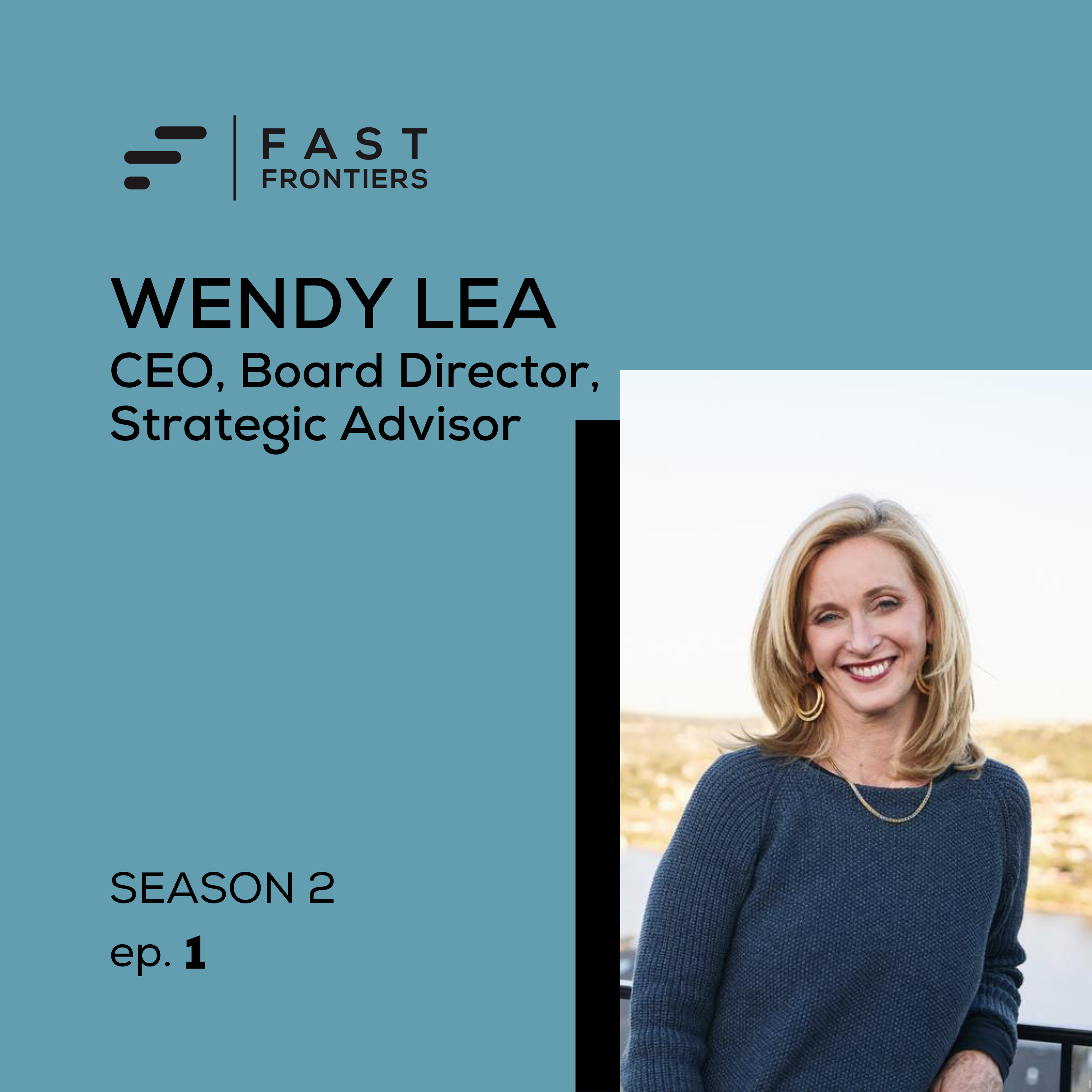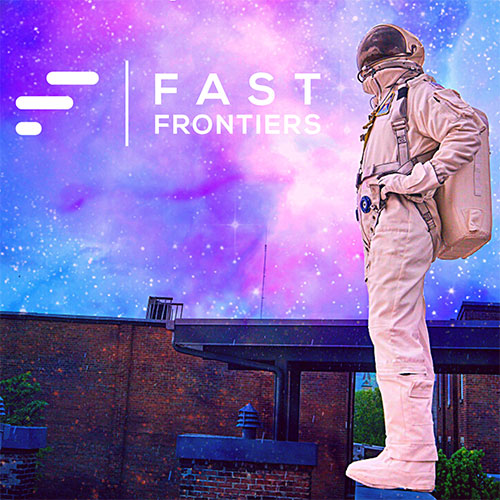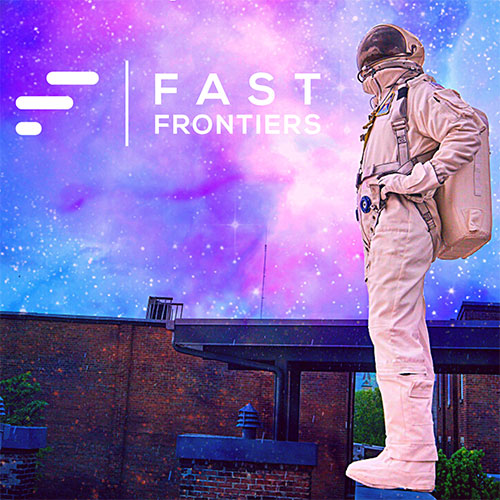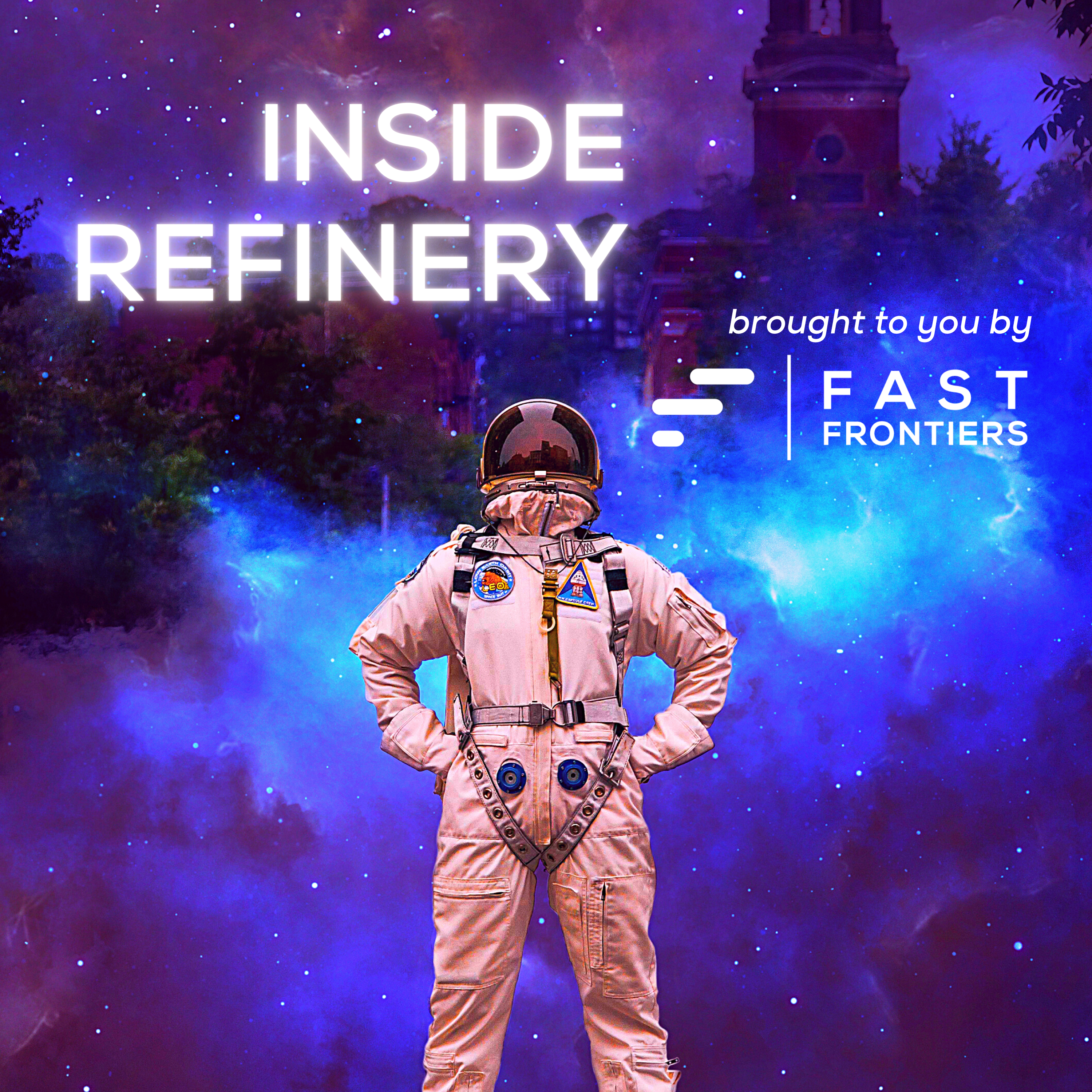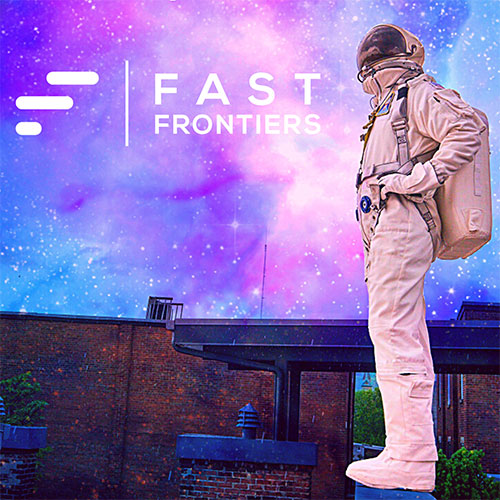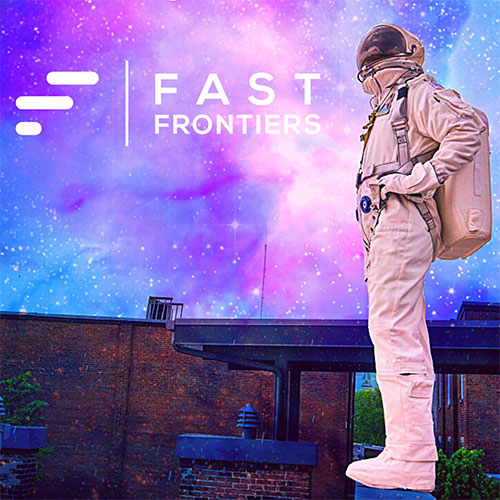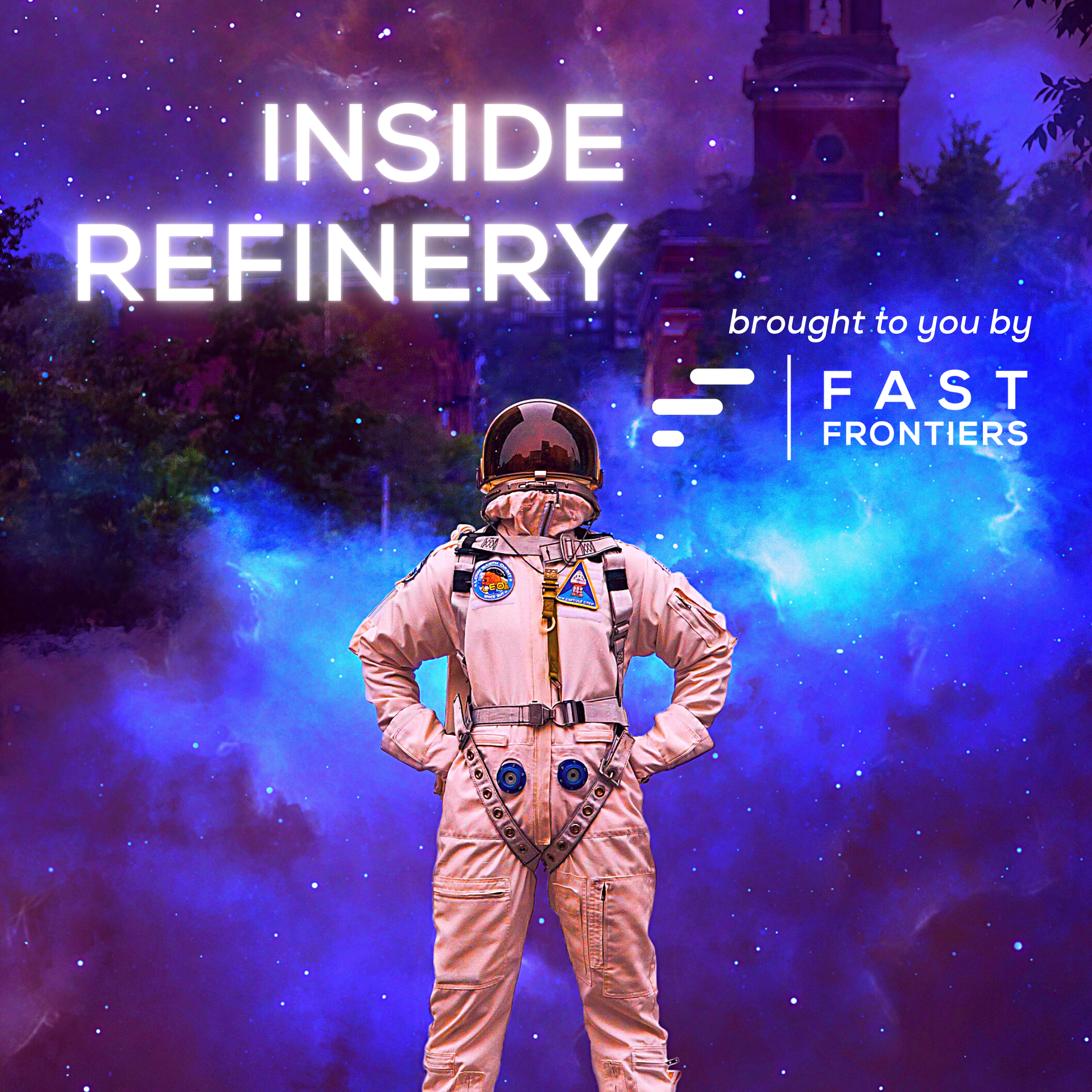S2 Ep 1. Wendy Lea: CEO, Board Director, Strategic Advisor
- 0.5
- 1
- 1.25
- 1.5
- 1.75
- 2
Tim Schigel: Welcome to Fast Frontiers. I am your host, Tim Schigel, managing partner of Refinery Ventures. In this episode, we're bringing you my conversation with friend, Wendy Lee, digital innovation strategist, ecosystem development guru, and currently the CEO of Energize Colorado. Wendy has a lot of learnings to share with us and unique experiences. These were formed by her intention and direction in life to be independent, self-reliant, and self-directed. Wendy shares her great stories of lessons she'd learned working for, as she calls, big CO's and small businesses that experienced big growth, which led her to ultimately become startup CEO and eventually successful angel investor. Please enjoy my conversation with Wendy Lee. Wendy Lee is a leading digital innovation strategist and ecosystem development guru. World-class. Wendy's currently the CEO of Energize Colorado, where she's mobilizing resources and relief for small businesses, nonprofits, and individuals recovering from the economic impact of COVID- 19. Wendy also serves on Danna, her water innovation and technology board, at P& G ventures advisory board, and several venture-backed startup boards. Wendy and I met in her tech startup in San Francisco, many moons ago, part of recruiting her to Centrafuse in Cincinnati, which I think is potentially where the ecosystem bug kind of was implanted, if you will. Welcome, Wendy. Good to talk to you again. Love to just first, before we get into what you're doing now, kind of how you got to this place. You've got a great, very interesting background. Multidimensional, many different facets and I think there's a lot that people can learn from the journey you've been through.
Wendy Lea: Yeah. That's a great question. Thanks for having me, Tim. It's an honor to see you and Abby again and to be a part of this podcast series that you're doing with folks around the world. What an honor it is for me to participate. Yeah. The question about how did I get here is really an interesting one because there was no career counselor that would have suggested this path. When I was graduating from university, there was no entrepreneurship program right at the University of Mississippi in Oxford, Mississippi that said," And if you're feeling that pull to be an entrepreneur, go and meet your peeps here on campus, like we do in Miami or we do around universities around the US now. There was none of that. I think the thumbnail is, my North star, even as a very young woman, graduating from university was to be independent. I share this story a lot. I did not want to be dependent on family, friends for wherever I was headed. I wanted to figure it out, pay my own way-
Tim Schigel: Self- reliant.
Wendy Lea: ...and be self-directed in the pursuit of whatever that was. There was no clarity there. I think that is, was a design principle of my life, to be independent. Now, I'm not saying that's great because I didn't use, I didn't have leverage. It's not that I didn't have any mentors, but I didn't have a lot. I was always in here thinking," Okay, well, what is your potential, Ms. Wendy Smith?" That was my maiden name." What is your potential because if you want to be independent, you got to get real clear with your potential." Even now it could change and grow, but those are two very important points for me. I diary about this all the time, because I share that with my nieces and nephews, when they say," What am I going to do? Well, who am I going to be?" well, first of all, decide your overall direction. Mine was to be independent, self-reliant, self-directed, and then decide what are you optimizing for? To be well known, to have a lot of money, blah, blah, blah, blah. I was optimizing for achieving my potential as a human. That comes back from the way I was raised, from my mom, and she's an active Buddhist, and that's all she ever said." You're in charge of your own potential, so pursue that." Okay. That's a design principle, but the thumbnail after that was really straightforward. I had to make a living. I said I had to be independent. No one was going to give me any money. I had a series of gigs, chapters of work, even when I was very young and married very young, because I had to provide food and have shelter and all the things that as citizens and humans have to have. I think I've got a groove going when I realized that there wasn't a formula. That there would be many experiences that I would have over time and I had to discover them and I could only discover them by being in them. For me not to feel any job or role was forever, because that was another thing my mother taught me, everything is impermanent. Okay. I had that in my DNA. Well, I can go do this and I don't have do it forever, but I'll go learn and see how it feels and then I'll go do that. My first phase was really focused on big company stuff, because I'm from Mississippi, working class family, they have benefits, big companies. They give you training because I mean, come on. Why not? I had a couple of bites at that apple, two different industries, but very significant learning. I was rough around the edges. I needed that professional training. I needed to be exposed to global issues. That was a great phase. That phase went from college graduation all the way through 29. That was two big industry, CPG and financial services, very important roles, both technical and outbound. It got good exposure and I got to tie that all in to see how it felt.
Tim Schigel: Looking back at that, actually now from here, the role that being in that maybe larger and more structured environment, how did that kind of help you and shape you?
Wendy Lea: It was very positive, but also it was like a rock in my shoe. It was positive because I got it. I could do it. I could comply. It wasn't like anyone was asking me to give up my arm, but it was like a rock in my shoe every day, because I questioned things, that most people didn't question. It seemed like everything was too over-engineered to me. Why are we doing all those steps? Why can't we just go to the end? I still observe that. I did it. I complied and I would get promoted, whatever that meant back in the day. I knew at 29 years old, I had hundreds of people reporting to me more than I could handle, by the way. I said," This is not for me so What is it about this experience I'm going to take the next one?" That's when I left, moved to Dallas and began kind of the career I'm still in, interestingly enough. At 30, I mean, meaning a technology-oriented perspective, focused on skills and knowledge and go to market. Really, it was I worked for an entrepreneur for the first time, not big companies, and I observed him and he was crazy as a loon, but I can really frame up business building. I was observing business building, even though I'd never done that myself.
Tim Schigel: Was there something that drew you to technology? How did you start to align with technology?
Wendy Lea: That's a good question. In this particular case, it was not tech in its own self. It was the fact our clients, when I was working for this very small business, not a venture-backed business, not a large corporation, it was our clients were technology providers. Okay. That's how I learn tech, is by serving them. I sold to them and I worked with them. That's how I learned about technology, about software and hardware, communication protocols, et cetera, is because they were my clients that I had to learn about their business, their goals, problems, and needs.
Tim Schigel: You got the bug.
Wendy Lea: I did.
Tim Schigel: Entrepreneurship.
Wendy Lea: It was a beautiful convergence around the world because I got to be global for the first time. I had to get a passport for the first time at 30.
Tim Schigel: How was that in terms of, back to you mentioned mentors or advisors, did you have somebody at that time that was kind of took you under their wing or?
Wendy Lea: Yeah. No, that's a good question. The owner of this firm.
Tim Schigel: It was the owner.
Wendy Lea: He owned it a hundred percent. I didn't even ask for any ownership. I didn't know any better. I'd come from a large company with a company car. What do I know? I knew that it was a small business and it was myself, his admin and his wife. That was it. I knew it was under a million dollars. That didn't scare me because I'm not scared about things like that. You know me well. I'm like," Okay, well we need to be bigger than this." I said," What's our goal?" He was like," To be bigger than this." I'm like," That doesn't suit me. I got to have specific goals." Actually, his name is Randy Murphy. He passed sadly while I was in Cincinnati. He was my mentor, complex human, very, very brilliant. I wanted to be just like him. I wanted to have his brain. I wanted to have his capacity emotionally. He was so good on his feet. He was just awesome. I didn't I failed early and often and he almost fired me. Then somehow I clipped and I figured it out. I was with him seven years and we grew that business from 500K to when I left, about 15 million and he owned it a hundred percent and I never questioned that. I didn't. Why would I? I was paid well. I was on commission. I traveled the world. I was learning like crazy, technology and models that we were building and teaching. It was the time of my life, Tim. It really was.
Tim Schigel: You were doing something you hadn't done before and taking places they hadn't ever been before?
Wendy Lea: I'd never done that work before, ever. I was a newbie. I was in a beginner's mind working with a very complex self-made entrepreneur, bootstrapping his business. I had so much to learn. It was overwhelming.
Tim Schigel: Unlike the situation you were in prior to that, when you're in a bigger company with process and overhead, and you're like," Why do we do this? Why do we do that?" In this case, did you feel like it was more connected? You understood why certain things happened or is it because you got to see more of it.
Wendy Lea: Yeah. I was in it. We would build product, services products. We would set up sort of certification so we teach others to teach others. You see what I'm saying? We watch cashflow every day. This was a real business, a bootstrap business.
Tim Schigel: That's one of the things I love about startups is you're not inheriting," Oh, we've always done it this way." Everything about the company, your organization, et cetera, is purpose-built for the thing you're trying to do.
Wendy Lea: That's right. No, that's well said. I do think he had had some hard wired ideas that I completely did not support. Example, he did not believe in marketing and it's not that I was a classic marketer. That would be an exaggeration, but I understood marketing because I work for very large companies that were big brands, General Foods, Allstate Insurance company. Yes. Part of Sears. I understood brands just intuitively. I understood demand gen intuitively. That you had to create demand with consumers. I've worked both B2B and B2C and I'd ask him about that. He goes," Oh, we don't spend money on that. We don't do that." I'm like," Why? That's going to help us grow." There was tension there, but there was also opportunity because finally he broke down and gave in. Because I was on the product development side. I was on the marketing side. I was on the sales side. I was the first outside employee beyond his assistant, and his family, his wife. It was a very interesting time. Then as I do remember, I'm about experiences. I'm about being self-directed. I'm about being independent. Then I started pushing back a little bit. That wasn't awesome for him. At the end of seven years, I said," I think I can do this on my own. He didn't like hearing that and he sued me for breach of IP, which of course, I didn't do, but he was paranoid. Good entrepreneurs oftentimes are. I learned a lot from that too. I set my sales out to go join another firm, not as the founder, but as an executive, not co-founder. That was in Europe. I left Dallas, Texas, and him, my mentor, my Rex Harris and my fair lady guy, started off on my own and lived in a place I never lived. That was a whole nother chapter. That's where I really got my chops globally. Understood a lot more about my weaknesses relative to cultural norms all dressed-up clothes, with my little Southern accent in Scotland and Russia and France and Germany. I actually was on the ground in all the countries in Europe and certainly in the UK with very big clients like IBM, delivering, selling and delivering basically sales training and marketing training. This time on a founding team, but not a founder of a group, similar to what I had done in Dallas.
Tim Schigel: That made you very attuned to the differences of culture, which I would imagine also is a big piece of what informs your decision making now and working with ecosystems. Not to just come in from one place to another and say," This is how we did it in Silicon Valley. Here's how we're going to do it in Louisville."
Wendy Lea: You have to be so sensitive to this. I was still young, still very naive, never money motivated, always motivated by learning about being self-directed going back to that North star. Yeah. I got to tell you, that was a rude awakening to be a Mississippi girl that had moved down from new Orleans to Dallas and now to the UK, and did not have any money and learning culture and learning how Brits look at Americans from Texas. Learning that you show you don't need to wear your red patent shoes when you're calling on IBM, that's not awesome because they were dark brown, black. This is somber. This is the UK. Just those kinds of things. It was hard. I made so many mistakes and, by the way, must have been painful. In other words, it would be visible in a crowd, that I said the wrong thing or didn't understand what they were saying. The rapid iteration of my experiences and my knowledge, I want you to know, it was painful. It wasn't like," Oh, yay. Thank you for that correction." It was based on failure and embarrassment and humiliation my own that I wouldn't have known that I would have would not have prepared. It was hard. It was very hard, but whatever.
Tim Schigel: Yeah. You learned. That's how you learn. Then you made your way ultimately to San Francisco.
Wendy Lea: I moved from the UK back to Dallas, which I did before. That was easy. Set up another company, my own company with a co-founder. For the first time I became a pure entrepreneur in Dallas, did very well. We went from zero to, I don't know, 7 million in two years, selling a very specific product only to high tech. I'm still in high tech, very deeply ground now. We did that. Then around the world, we were growing that business. Then we were acquired by a bigger entity. There was a good match there. We continue to acquire others. Then we were acquired as a total entity by Siebel and still had not gotten to California. I lived in Dallas at that time. We moved to Boulder for a couple of years. That's when, after the Boulder experience, I've moved to San Francisco for a decade and that's after an exit. Things were different. I did have money. I had a different kind of experience of building a business from scratch being acquired twice, even in one year, having money. I never thought about having, and now I was an angel investor and had the startup bug, venture-backed startup bug. Remember how late that came. Big co, small business, global business, entrepreneur. Yes. Then after an exit saying," I haven't even learned, I haven't begun to learn what I need to learn about startups. I never saw us as a startup. I saw us differently." I had a lot to learn and spent one decade and learning mode around venture-backed startups in the Bay area, massive learning, including investing as an angel and running companies that didn't go well, some did go well, but mostly not well. It was hard. I did not go to the beach or buy a Rolex or whatever they, or fancy cars. I stayed in it to learn, and because I'm self-directed and I needed these experiences and I knew I hadn't come close to my potential as a human or as a professional.
Tim Schigel: When you are connected with somebody, mutual friend, that was also top woman entrepreneur and investor, Heidi Roizen.
Wendy Lea: Yeah. She's one of my best friends. I talked to her last night.
Tim Schigel: Oh, did you? You definitely were learning from some of the best you were there.
Wendy Lea: Yes. I think so. Brad Feld had a lot to do with that because he actually was Heidi's partner at Mobius, if you remember, Soft Bank and Mobius. It's actually Brad that introduced me to Heidi. Yeah. Heidi and I have deepened our relationship over the years. I feel like part of her family and yeah. I did. I was blessed with being raised with an understanding of relationships, Tim, like you. I always treated my relationships with grace. With respect and whoever I met or was introduced to, by anyone. I found that an honor. I really doubled down on that even, as a young woman, and continue that even to being an elder, a wise elder these days. Relationships are everything. Yeah. I think this relationship stuff, just to tip on that a little bit, I do think in our new world of Zoom and in our world of social platforms, which was 15 years ago that all that happened, which are longer, which accelerated a lot of these connections. What I wonder about now in the spirit of life is how many of those connections really connected, in terms of value exchanged and relationships truly and developed. I don't think even for us, and we have a lot of serendipity about our introduction and Heidi and I too. We're women, we're the same age. We didn't do the same work, but we understood the technology. There are a lot of reasons for us to be able to connect, but there are a lot of reasons for us not to. We really had to be mindful of what were the drivers of our kind of humanity, our human existence, but personally, of course, and professionally. That's how these connections where we grow, strengthen and develop into lifelong relationships, which is what you and I will have. Which is what many of my friends in Cincinnati and I will have, and I know that to be true. I invest, as you do, in those connections because they have converted into relationships that matter. I just want that to be heard and to know that at this stage in my life, I wouldn't be doing the work I'm doing without those relationships. I didn't know a lot of people in Colorado when I moved back here. I knew a few, most of them in Boulder. Now, the work I do is across the whole state. How could that be? How could that be? Not just because I was a groupie of Techstars or I knew Brad. It takes a lot more than just one person or one experience to give you another shot on goal at achieving your potential as a human.
Tim Schigel: That was really, I think, exemplified when you came to Cincinnati for Cintrifuse because you very, very quickly worked your way into the community. I don't mean that in a superficial way, or just say," Hey, I know who that person is or that CEO is," but you built so many relationships with so many people who became friends of yours and vice versa.
Wendy Lea: Because they taught me. They were patient with me. Then over time, I was able to bring value to them. Not in the beginning because I didn't know Cincinnati, I didn't know. There were so many things I didn't know, so many, it was overwhelming. Yet, I can tell they wanted to help. I felt responsible, of course, to delivering impact for the region. It was quite natural, but also overwhelming. I would say that to others that may be listening, is that you don't know for sure in the beginning of a new role or new experience, you don't really know the value. You're going to be able to exchange over time. All you can do is stay present and listen and learn and observe. Listen, learn, observe, be mindful of where you are and how that plays has certain cultural norms and how that plays going back to my experience in Europe and just be mindful of that. Remember, I moved to Cincinnati when I was 60 and I never lived there before. Think about how much I didn't know, but I was curious and I respected that I had a job to do. I respected that what I did in California was not a complete port over. It was not. I remember every time I was introduced as an executive from Silicon Valley, I went," Oh my God. Oh, please don't refer to me that way." I lived there and the Bay area for 10 years. I had vested in, hung out with some very important people, but to call me a Silicon Valley executive, was a bit of a stretch. That helped with legitimacy, I guess, but I would never have ported that knowledge or that 10 years of experience, poured that into Cincinnati. That would have been an F, not the right thing to do.
Tim Schigel: That listening and curiosity has helped you, then to... People, weren't looking to you for the answers to anything and you didn't have the answers, nobody did. You facilitated and coordinated and then you gave a voice to what the people and the stakeholders wanted to do. You probably do this in everywhere you go. You gave a voice in your unique Southern way, so people started talking about their dirt and instead of large corporations, it was big cos and et cetera, et cetera. Some of the Wendy- ism still survived today. Funny, when I hear people say just the little things in their sentences, I'm like," Wendy was here." Take us to today now, Energize Colorado.
Wendy Lea: My little silver lining.
Tim Schigel: Yeah. I haven't even had the chance to learn a ton about it, so I'm looking forward to hearing more about what you're doing and how that brings together all of these learnings you've had through your various tours of duty.
Wendy Lea: My tours of duty. Well, first of all, as we all know, we're in a very complex set of crises. Not just public health, but economic and mental health, as well as social injustice, racial inequity. When you're in that hairball of complexity, one has to really think through how are you going to maneuver through that? Our own governor, Jared Polis, who is a entrepreneur, and who's a technology guy, he had just been voted in, in November. The crisis hits in March. He doesn't even have his feet wet when he is facing a challenge beyond any challenge imagined. He called on his private sector, friends and colleagues to help him think through everything in collaboration though, with his cabinet. Okay. It wasn't Jared talking to just one or two people in the private sector. He had to bring resources to bear from his cabinet from the public health czar to the economic developments czar, and everybody in between, those agency leads. That's how it really Energized Colorado. I won't go into the origin story per se, but just imagine that happening. Colorado is not a big business state. It's not like Ohio. It's not a big coast state. It is a small business state. We have 670, 000 small businesses. 97% of our economy is wrapped around that part of the whole state. That's a lot. The net net is Saru, Governor Polis' desire to learn from lean into private capability, and to pull public and private capability together, Energize Colorado was born, first to help stabilize in reopening of our small misses sector, 500 employees or less, including nonprofits across the state. Then to help think through the build-out of a resilient economy and an inclusive one. We are a wild and crazy group of about 500 spirited volunteers with an ethos of Coloradans helping Coloradans that are building products and services to help the small business sector, again, maneuver, navigate through the hairball and begin to think about this next economy, being more resilient and more inclusive. It is just hard demanding for me of a full volunteer. I'm not paid to do this. I have six co-founders, Brad Feld being one. Brad and I short term, have funded the nonprofit while we were very focused on raising a fund for small businesses, not a venture fund, but a fund of grants and loans and Cares Act money, a very broad capital stack. We're month seven. We've launched four major initiatives. We're framing out for more around digital readiness, digital innovation, no surprise that we would do that. It's just amazing work and everything I learned in Cincinnati, I have a chance now to reorient those learnings so they can fit into the culture of Colorado, which is very different. It's just an honor and a privilege to do the work and all these volunteers, I'll end on this, these volunteers I work with every day, do you know that I've only met three of them?
Tim Schigel: You're making all this impact, all of this progress, initiatives, et cetera, et cetera. It's all been on Zoom.
Wendy Lea: All on zoom. If you go to energizecolorado.com, which was built by volunteers, if you look at any of our initiatives, if you go to our leadership team, yes, I have one, shared services, product builders, and go to market leaders. No surprise that I would do that, because we're covering minority-led, women-led, rural businesses, front rain businesses, veterans businesses. We segmented small into chunks. We have leaders that listen and learn to the needs of those segments, so we can fill gaps. We have partnerships, we can do nothing on our own. What can we do? We have people that volunteer five hours to maybe 60 hours. Depends. I have learned so much. In my mind's eye, I imagined Energize America, because this is a volunteer-led model with very specific initiatives that are built and stanciate through a website. This is stuff we know how to do as entrepreneurs.
Tim Schigel: Well, that taps into something Brad talked about in his sort of communities book, which is organic.
Wendy Lea: Absolutely.
Tim Schigel : Not top-down.
Wendy Lea: No. We experiment all the time and we shut down as many projects as we launch initiatives. Why? Because we don't know. We don't know if they're going to work. So far, we haven't had to shut down but two. When I say shut down, they just didn't work. What we built wasn't right. The audience didn't want to use it. The success, the impact that we're building so far now, as an entrepreneur, as a CEO, I can see what takes hold and not, but this is a big state. We've got an urban part of the state and a rural part of the state, not so unlike Ohio, by the way. Our rural folks are different from yours because we're mountain people. Our small business sector, I'll end on, this is deeply, deeply in the hole right now, deeply in the hole. This is not a reboot effort. This is a rebuild, for sure. Some of these businesses will never start again. Some, maybe shouldn't. Others have started again and have found new strings of revenue. Not just through technology, but just through their own hotspot and their own will and their own discipline, working closely with their customers. It is like no time I've ever experienced. I love the work, yet it is very, very hard because you're trying to trend line products and services. You're not knocking on doors. You're not sitting having coffee with people. You're doing things digitally. It's lonely. It's not like I'm collaborating with people down the hall like we did at Union Hall. I miss that. I miss that because you have a tendency to over-intellectualize things because the spirit of the work doesn't get out as much. I've already done three presentations this morning to groups of chambers in Douglas County or civic organizations or entrepreneurs. That's what I do. Spread the word because my job is to make sure these offers, these offerings get in the hands of small businesses, not just startups. That's just one segment.
Tim Schigel: That is terrific. I know it's tough and it's a challenge, but that's often where the best innovation comes from that crisis. If it weren't for COVID, maybe there's some things that should have been questioned that are getting looked at fresh. Hopefully, when we look back in 20 years or even longer, there's Energize Colorado, Energize America. That much of what you're doing now, who knows the impact it's going to have longterm.
Wendy Lea: Who knows? This is vision. If you're made, if you're you, entrepreneurs have to have a clear vision, as well as a mission. Those are two different things, as you well know. Then we have to execute with a very clear set of intentions, objective strategies, et cetera, to come close to the mission. You can accomplish the vision. Execution is part of my game, and there's a have a sense of urgency as well. I feel proud. Thank you for asking.
Tim Schigel: You should be. It's great to see energized Wendy. Right now, I could tell you're you're in your element. That is awesome.
Wendy Lea: I am.
Tim Schigel: Thank you very much, Wendy. It was great to see you. Thanks for sharing with everybody.
Wendy Lea: Yeah. My pleasure. Thanks to everyone who listened or who will listen. Take care.
Tim Schigel: Thanks for listening to Fast Frontiers. If you like our show and want to know more, check out our website, fastfrontiers.com. If you enjoyed this episode, please share it with others and leave us a review on your favorite podcast platform. Again, in this first week of Fast Frontier, season two, we have three great conversations to share. You can listen to them all right now. Join us next week when we bring you my conversation with Noor Sweid, General Partner at global ventures.
DESCRIPTION
Today's conversation is with friend, Wendy Lea, digital innovation strategist, ecosystem development guru, and currently the CEO of Energize Colorado. Wendy has a lot of learnings to share with us and unique experiences. These were formed by her intention and direction in life to be independent, self-reliant, and self-directed. Wendy shares her great stories of lessons she's learned working for, as she calls them, "Big CO's" and small businesses that experienced big growth, which led her to ultimately become startup CEO and eventually successful angel investor.
Please click on any related resources below for more information about what we discuss in this episode.
Today's Host

Tim Schigel
Today's Guests


